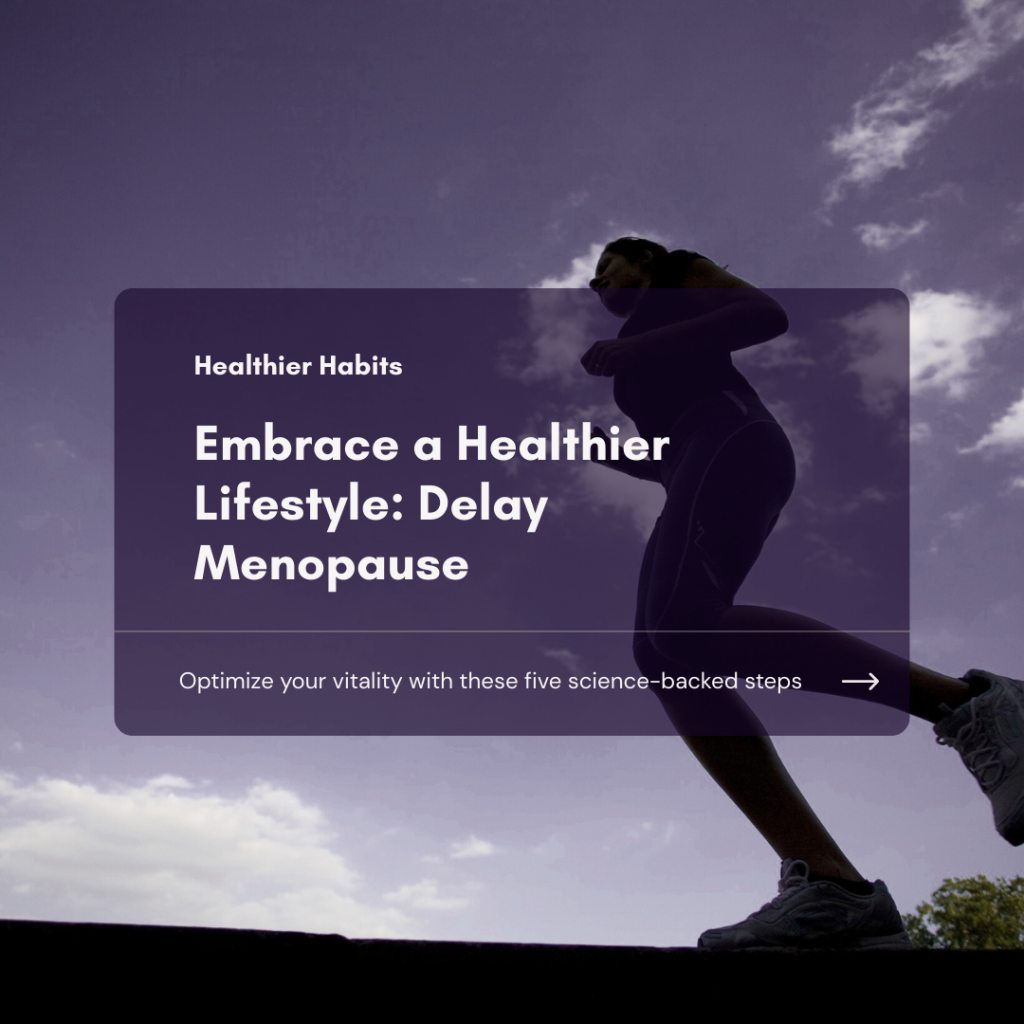5 Ways to Delay Menopause and Protect Your Vitality


Paige Elizabeth
Founder and Coach
Menopause is inevitable, but when it arrives — and how intense the symptoms are — is not fixed

Stress, lifestyle, and environment all play a role in accelerating or delaying the transition.
Too many women are told, “This is just what happens,” when in reality, you have far more influence than you think. By addressing the root drivers of dysfunction and supporting your nervous system, metabolism, and hormones, you can delay menopause and experience it as a natural evolution rather than a crash.
Here are five science-backed, practical ways to extend your vitality.
1. Heal Your Nervous System
our nervous system is the master regulator of your hormones. When you live in fight-or-flight mode, the brain down-regulates reproduction because survival always comes first. Chronic stress tells your body: “This isn’t a safe time to thrive.”
Over time, this accelerates ovarian decline and pulls menopause forward.
How to reset the nervous system:
- Breathwork: Exhale-focused breathing (inhale 4, exhale 7).
- Somatic release: Gentle shaking, yoga, or trauma release work.
- Mantra or meditation: Retrains the nervous system to expect safety.
- Boundaries: Protect your energy by avoiding triggering communication early in the day.
When your body feels safe, it extends fertility and delays the transition.
2. Regulate Blood Sugar
Blood sugar instability is one of the fastest ways to age the ovaries. Every spike and crash is a stress signal that raises cortisol and inflames tissues. Insulin resistance not only drives weight gain and fatigue but also accelerates the decline of estrogen and progesterone.
How to regulate blood sugar:
- Eat 20–30g protein at every meal.
- Pair carbs with fat + protein to slow absorption.
- Avoid long fasting windows that spike cortisol.
- Eat consistent meals every 3–4 hours.
Stable blood sugar = stable hormones. Stable hormones = a smoother, later transition into menopause.
3.Build and Protect Muscle
Muscle is more than strength — it’s a metabolic and hormonal organ. It’s your body’s largest glucose sink, pulling sugar from the bloodstream.
Benefits of muscle:
- Improves insulin sensitivity.
- Reduces inflammation.
- Protects bone density.
- Balances hormones.
- Supports nervous system regulation.
How to build muscle:
- Strength train 2–4x per week (squats, presses, deadlifts, pulls).
- Aim for ~1g protein per pound of body weight (as tolerated).
- Sleep 7–9 hours for recovery.
- Include resistance training even during weight loss phases.
Think of muscle as metabolic insurance. The more you have, the more resilient you’ll be.
4. Trash the Bad Habits
Certain habits are menopause accelerators that wear down your system and push reproductive decline earlier.
- Smoking: Reduces ovarian reserve and triggers earlier menopause.
- Alcohol: Disrupts blood sugar, raises cortisol, and damages liver detox pathways.
- Sleep debt: Prevents hormone repair and accelerates metabolic dysfunction.
Better choices:
- Limit alcohol to 1–2 drinks per week.
- Replace smoking with nervous system tools (breathwork, licorice root).
- Practice good sleep hygiene: dark room, no screens an hour before bed.
These aren’t restrictions — they’re investments in your longevity.
5.Prioritize Proper Macros and Micros
Your hormonal system runs on raw materials. Without the right balance, your body can’t sustain reproductive function.
Macros:
- Protein: Builds muscle, neurotransmitters, and satiety.
- Fats: Build estrogen/progesterone (cholesterol is the base).
- Carbs: Fuel thyroid + cortisol regulation.
Micros:
- Magnesium: Supports progesterone, reduces hot flashes.
- Zinc: Crucial for ovulation + ovarian health.
- B vitamins: For energy metabolism + hormone detox.
- Selenium & iodine: For thyroid function.
Food is your first hormone therapy. When cells are nourished, menopause doesn’t have to hit early or hard.
The Bottom Line
Menopause isn’t a punishment — it’s a transition. But how early it arrives, and how difficult it feels, depends largely on how you’ve supported your body.
By healing your nervous system, stabilizing blood sugar, building muscle, removing harmful habits, and feeding your cells properly, you can delay menopause and experience midlife with clarity, strength, and vitality.
You don’t have to fear the transition. You can prepare for it.
